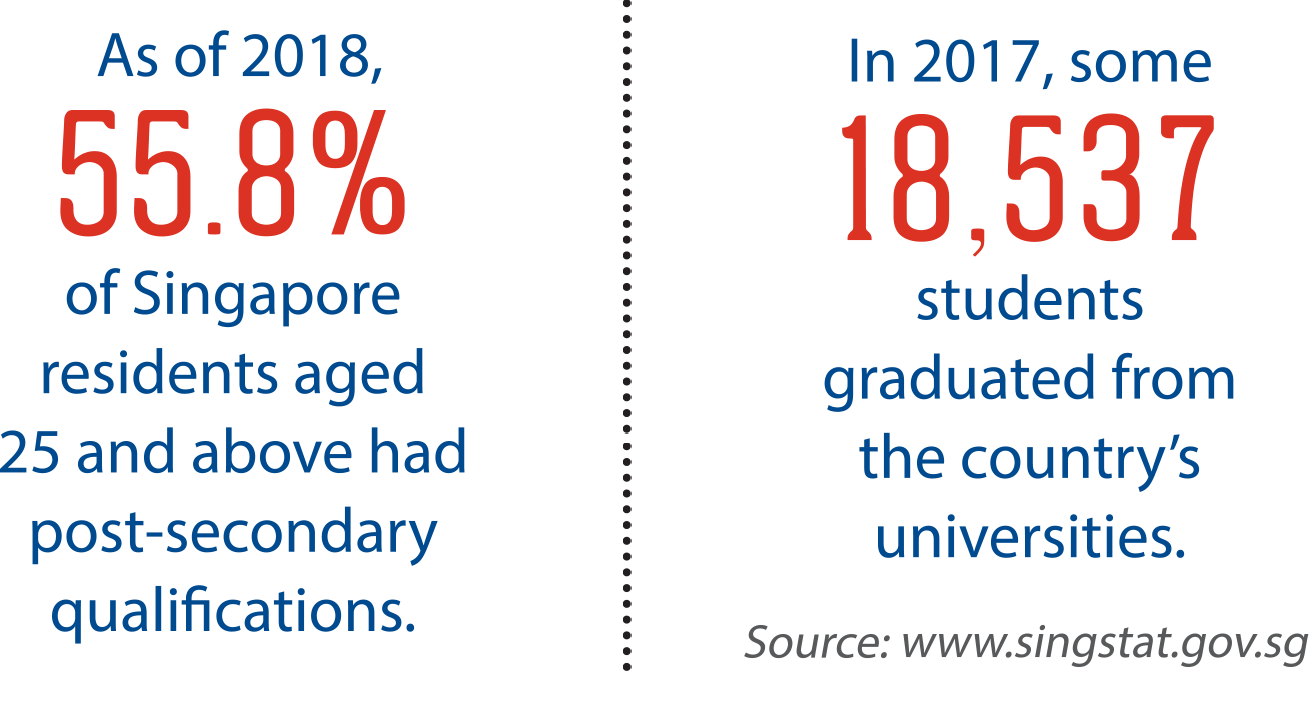Can Education Make Singapore Equal Again?
The first installment of NUS’ newly-revived forum series played host to a passionate debate about an issue that is close to the hearts of many.
TALKING IT OUT
Unlike the previous series, which featured a single speaker delivering an address, the new format of U@live sees a panel discussion featuring subject matter experts who are able to contribute diverse views and perspectives on a particular topic of global significance.
 From left: Prof Tan Tai Yong, Minister Ong Ye Kung, Mr Viswa Sadasivan, Mr Andreas Schleicher and Mr Ng Qi Siang.
From left: Prof Tan Tai Yong, Minister Ong Ye Kung, Mr Viswa Sadasivan, Mr Andreas Schleicher and Mr Ng Qi Siang.
Take two hot button issues, add in a dash of the Education Minister’s insights, and stir in more than 400 engaged NUS undergraduates and alumni. What do you get? A U@live forum that over-ran by an hour as people kept coming up to the microphones to share views, ask questions and offer suggestions. Among the ideas: Nationalise all kindergartens; have smaller student-teacher ratios; cap fees at preschools. The suggestions came fast and furious at the forum on whether education is still a social leveller today. It was organised by NUS Alumni Relations, and held at the University Cultural Centre on 27 March. The forum’s panellists were Education Minister Mr Ong Ye Kung; Mr Andreas Schleicher, Director for Education and Skills at the Organisation for Economic Cooperation and Development (OECD); Yale-NUS College President Professor Tan Tai Yong; and Yale-NUS Year 4 student Mr Ng Qi Siang.
Prof Tan noted that in the 1960s, education was a social leveller and Singapore was then a “classless society”. However, over time, society has become more stratified and there is less social mobility now. “Singapore’s education system has become too differentiated,” he said, in that it now sorts students by abilities, aptitudes and performance. But these aptitudes are not entirely free from socioeconomic factors, and so as a result, “performance is not determined entirely by an individual’s natural and inherent abilities, but is, to a large extent, a function of socioeconomic and environmental conditions,” Prof Tan elaborated. He described Singapore society as consisting of people moving upwards by riding different escalators, all moving at varying speeds. “This will create a widening effect. Is it easy to cross these escalators? Not impossible but, I think, quite difficult. And we must recognise that there are people who feel that they are not even on the escalators, but having to negotiate flat roads, manually.”
![]()
“Imagine the government says, ‘No, you cannot (invest in your children) because it’s unequal.’ Do you know how unreasonable that can sound? I believe, instead in ‘Let’s try our best not to cap the top but do our best to lift the bottom.’” Minister Ong Ye Kung
Mr Ong’s observation was that Singapore has managed to lift many families out of the lower-income bracket, but that those who have been left behind appear to be in a more dire state than before — in comparison to those who have been moved up. To him, education is still a social leveller in Singapore today. His point was this: “We’ll do a simple test. Tomorrow, let’s close down all schools, fire all the teachers… Does inequality get better? Definitely, no.” What can be done, said Mr Ong, is to improve the system. He pointed to the recent announcement to do away with streaming in secondary schools, as well as the removal of the 20 per cent weight that had been given to O-level examinations results, when polytechnic graduates apply for local universities. The Uplift programme that provides an annual scholarship for lower-income pupils studying in independent schools, was another example brought up by Mr Ong. In counterpoint to Prof Tan, Mr Ong said that the education system should be more differentiated so that different kinds of talent could be nurtured.
SCHOOL RULES!

On Elitism and Equitability
Mr Schleicher gave an overview of the situation in the OECD. “When I compare data between 2006 and 2015, we haven’t really moved an inch towards being more equitable in education,” he said. “That’s quite disturbing, given how much we’ve spent on it.” For him, the most worrying part is in the area of early childhood education, as wealthy families are able to identify the best places and send their children there. As a result, even early childhood education tends to reinforce social inequality.
Preschool education was a hot topic during the forum’s question-and-answer segment. Panel moderator and U@live Chairperson Mr Viswa Sadasivan (Arts and Social Sciences ’83) was concerned that a system of expensive and cheaper preschools would lead to an effective divide at a young age. Mr Ng, who was a member of the team that won the essay competition that was based on the topic, proposed that the Government consider nationalising all preschools. Mr Ong’s reply was that such a move would be too drastic. For him, MOE kindergartens are the practical solution. Such kindergartens are good-quality alternatives to expensive preschools, and give priority to children from low-income families. To Mr Viswa’s point about the wide gap in fees, Mr Ong said that equality could be achieved by stopping those at the top from performing “so well”. However it is natural for parents to want the best for their children. “Imagine the government says, ‘No, you cannot (invest in your children) because it’s unequal.’ Do you know how unreasonable that can sound? I believe, instead in ‘Let’s try our best not to cap the top but do our best to lift the bottom.’”
Reducing class sizes was another hot topic with many questioning the current class size of 40 students to a teacher. Mr Ong pointed out that while class size remains at 40, the teacher-student ratio is actually lower. In primary schools, it is 1:15 in terms of the overall numbers of teachers and students. In secondary school, it is about 1:12 or 1:13 and while the ratio in junior colleges was 1:11. “Why is the class size still 40?… It is because the extra resources are (there) to pull out weaker students to teach them, sometimes four-to-one, eight-to-one, one-to-one.” He said if the Government did the popular thing and announced that the class size would be 20, the resources available to help weaker students would disappear. “This is something I am extremely reluctant to do,” he said.
THE WRITE STUFF

The winning entry for the essay competition was titled DreamFund: Enabling Life-long Dreams for All Singaporeans.
It was co-authored by a team that comprised:
Mr Ng Qi Siang / Yale-NUS Year 4
Mr Ng Yi Ming / Yale-NUS Year 2
Ms Heather Cheng Hoi Yeuk / Yale-NUS Year 1
The Runners-up:
Mr Brandon Yip / Arts and Social Sciences ’18
Mr Isaac Neo Chong Yi / Arts and Social Sciences Year 4
 Attendees got a chance to meet Mr Ong up close and share their thoughts with him.
Attendees got a chance to meet Mr Ong up close and share their thoughts with him.
Food For Thought
Among the attendees at the event was Mr Yeo Keng Joon (MBA ’95), a managing partner of Global Biotech, an investment firm and consultancy. He said the forum’s topic was well selected and the panellists well chosen. He also observed that the quality of the questions asked was also very good. Ms Chang Meiping (Science ’03), a former teacher who now works for the Spiritual Assembly of the Bahá’ís of Singapore, felt that the forum managed to cover the views of people across the spectrum though a deeper dialogue on more focused themes would be needed to tackle the issues. She also enjoyed the networking session that followed. “I had conversations with individuals who shared their own experiences and challenges. Fundamentally, regardless of the social strata one is in, there is always the nagging fear that one is never good enough, which is a symptom of a materialistic and competitive culture,” she said. Mr Chandra Mohan K Nair (Law ’76), a partner at Tan Rajah & Cheah, said of the event. “Overall it was a very good session for all of us — students teachers, parents and alumni. I really enjoyed it and it was quite insightful.”
UPCOMING EVENT
Islamophobia
30 Oct, 7.30pm
Register at alumnet.events/UALIVE